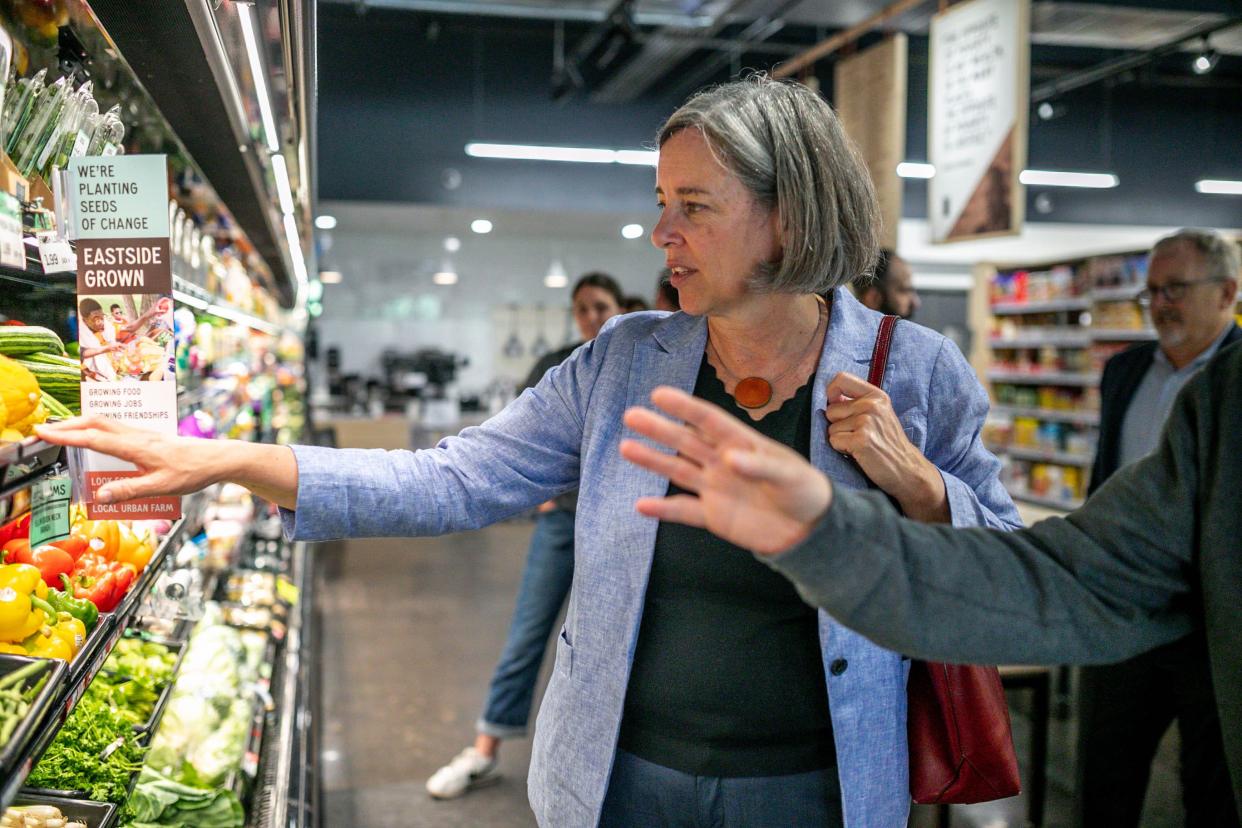Oklahoma declines to join new summer food program for children, a disappointment to some child advocates

Despite one of every five Oklahoma children living through food insecurity, the state won't participate in a new federal summer food program for children.
Gov. Kevin Stitt's office cited uncertainty about how the federal government will administer the program.
The Summer EBT program would have doled out $40 per month this summer for children who get free or reduced price meals during the school year. Families would be able to purchase groceries using an electronic benefits transfer, or EBT card. It's similar to the pandemic-era children's food program that recently expired, which gave eligible families $120 per child to buy food during summer months.
Chris Bernard, president and CEO of the nonprofit Hunger Free Oklahoma, said the governor's decision was extremely disappointing.
"We are always in the bottom 10 in the country in terms of food security," Bernard said. "Families and kids are struggling for sure, and the (summer food) program was something we've supported for a long time."
Estimates vary, but Oklahoma has about half a million children who could qualify for the Summer EBT program. USDA estimates there could be 403,000 children who are eligible, while the number of children eligible for a similar program launched during the pandemic was about 640,000.
Stitt's communications director noted that the U.S. Department of Agriculture hadn't yet finalized the Summer EBT program's rules before asking state governments to sign up for it.
"Oklahoma already has multiple programs to serve food insecure children across Oklahoma, including SNAP (Supplemental Nutrition Assistance Program) benefits, Oklahoma State Department of Education Summer Food Program and the Regional Food Bank of Oklahoma’s Summer Feeding Program," said Communications Director Abegail Cave. "The governor will remain in communication with Secretary (of Human Services Deborah) Shropshire and the staff at Oklahoma Department of Human Services to ensure the programs available are sufficiently serving the kids that need it."
Information about those food programs can be found at beaneighbor.ok.gov.
Generally, there are two ways the government can provide food. EBT cards can be used like cash at the point of sale when buying groceries, but some food programs require people to congregate somewhere to pick up their meal. The latter requires significant planning and coordination among the menagerie of nonprofits summer camps and local governments, so it's considered a more difficult way to ensure services reach those who need it most.
"Some Oklahoma groups have been pushing (for EBT programs) because the congregate model doesn't really work in rural Oklahoma," Bernard said. "And then the pandemic kind of showed that to people."
The federal government will fund the benefits, but Oklahoma would have to pay half the cost of running the program. Officials said that cost typically is about 10% of the total amount of the food distributed. The actual cost would depend on the number of participants and other factors not yet known.
While disappointed, Bernard said he was hopeful Oklahoma would participate in the future.
Oklahoma not alone in rejecting benefits
According to USDA, 36 states, tribes and territories had notified the agency they would participate in the food program. The deadline to sign up was Jan. 1.
Some states, however, decided against participation. Governments in Iowa, Nebraska, South Dakota and Texas are among those who have publicly criticized the program or its cost. The federal government will allow states to participate in future years, even if they declined to participate in 2024.
Despite the state's decision, however, some Oklahoma families will receive summer food benefits through the new program. Both the Cherokee Nation and Chickasaw Nation have signed up, which allows any student attending a public school on their reservation territories to receive the funds.
Hunger Free Oklahoma plans to work with tribal nations to ensure they reach as many kids as possible in their service areas, Bernard told The Oklahoman.
Even though Oklahoma refused this round of funds, Bernard said he believes the state cares about feeding children and families. Oklahoma accepted about $50 million in summer food funding last year.
"It's really disappointed to see it not happen in 2024, but I am confident that just because the state's not currently planning on doing it this summer, long term we would hope, and we would push for the state to do it in 2025 and years to come," he said.
How hungry is Oklahoma?
The most recent Kids Count annual report, a national report on the well-being of children, shows Oklahoma fell in the rankings of nearly every category measured. Oklahoma now ranks 46th in measures of economics, education, health, family and community.
According to that same report, nearly one in every five children faces food insecurity.
In February, as pandemic-era emergency food benefits came to an end, the CEO of Regional Food Bank of Oklahoma wrote an op-ed highlighting Oklahoma's continued challenges.
"In the past few months, Regional Food Bank of Oklahoma staff have answered an increasing number of phone calls from concerned Oklahomans, worried about how they are going to provide enough food for their families when the emergency allotments end," Stacy Dykstra wrote. "With skyrocketing food prices, too many of our neighbors will be forced to make impossible decisions between paying for groceries and other necessities like rent, utilities and medication."
Tribal involvement in the Summer EBT program will open benefits to children attending public schools in those reservations, so there are more opportunities in eastern and central Oklahoma. Bernard, with Hunger Free Oklahoma, said his nonprofit will work with the Oklahoma State Department of Education and summer meal site sponsors in western and rural Oklahoma where Summer EBT won't be an option.
This article originally appeared on Oklahoman: Oklahoma rejects federal Summer EBT food program

